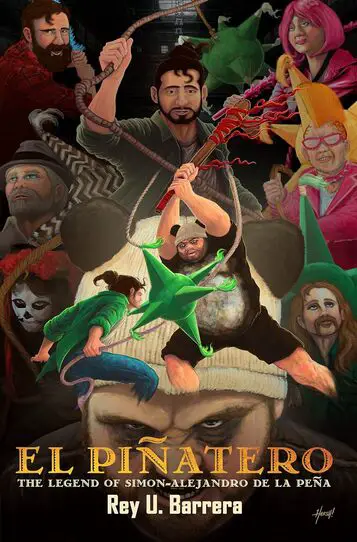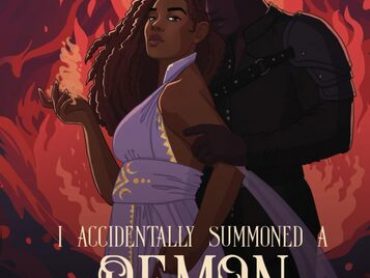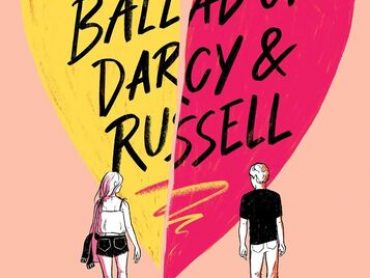Rey U Barrera is the author of El Piñatero – The Legend of Simon Alejandro De La Peña. El Piñatero – The Legend of Simon Alejandro De La Peña follows Simon-Alejandro who dreamed big about small things. The novel explores balancing his new life. YEM was able to speak with Rey about why being a piñata puller that is so important to Simon-Alejandro, what he learned from writing this book, and who an author that inspires him is.
Young Entertainment: When did you first know that you wanted to be an author?
Rey U Barrera: My love for writing started in high school when we had to read The Adventures of Huckleberry Finn by Mark Twain. I read an interview with Twain where he referred to Huck and Tom as “his boys”. I found it intriguing that he had that feeling towards characters he created, so I started writing short stories, creating characters and scenarios just to find that feeling that Twain must have felt. I wrote a novel in college that never really went anywhere, but my love of writing long format never went away.
YE: What is it about being a piñata puller that is so important to Simon-Alejandro?
Rey: I would say that there are two levels of importance to Simon for being a piñata puller. One is simply that he enjoys doing it. It’s something he watched his uncle do when he was a kid, and he recalled how much enjoyment the children at birthday parties got out of hitting the piñata, and it was a feeling he wanted to continue to instill in others.
Secondly, it’s a bit of stubbornness on Simon’s part in believing that something so trivial could become a career. It’s important for him to prove to his friends and family that anything is possible.
YE: How would you describe Simon-Alejandro in three words?
Rey: Determined, stubborn, and passionate.
YE: What was your writing process like writing El Piñatero – The Legend of Simon Alejandro De La Peña?
Rey: It was an interesting process for me because this book started off as a movie concept. In fact, we produced a short prequel film and won a few awards at various film festivals. In 2020 we were going to start production on the feature. The script had been written and a few actors were ready to go. And then COVID happened, and everything shut down. So, I spent that year transcribing the story to a novel format. It’s something I had always wanted to do, so I took advantage of that down time to write it. I used the script as a guide, but I was able to take so many scenes and elaborate on them because of the freedom that writing a novel provides. I didn’t have to worry about effect budgets. And for that warehouse scene, where I’d normally have to find dozens of extras for a film set, I could now just write in hundreds of participants.
YE: Where did your inspiration for your book come from?
Rey: With El Piñatero, I was inspired by a real uncle’s talent for pulling piñatas for our family at almost every gathering. My close cousin and I were watching him perform the same piñata techniques that he would when we were kids, and we joked about the possibility of him being in an underground league of piñata fighters.
While the concept came from a real piñata puller, there’s a funnier inspiration for the overall plot. When I was much younger, I visited a small town in Mexico with my parents. I saw a lot of taco vendors pushing small food carts, and I told my parents that I wanted to be a taco vendor when I grew up. Not that there’s anything wrong with selling tacos for a living, but my parents thought it was funny that this was my dream job. The story of El Piñatero is that of taking a seemingly small dream, like pulling piñatas for a living, and following it to grand results.
There’s a little nod to the movie, The Last Starfighter, in the book. I felt it important to pay tribute to a movie that followed a similar premise of believing in small dreams.
YE: What did you learn from writing this book?
Rey: I learned that “wanting to write a book” doesn’t automatically fill pages for you. I mean, sure, we live in the world of AI where some of that is possible. But actually writing a book takes a lot of work. And motivation… oh, the motivation. Telling yourself to sit in front of the computer for hours, instead of playing games or watching movies, takes effort. It’s the same effort I’m having to put into writing the sequel now.
YE: What do you hope readers take away from El Piñatero – The Legend of Simon Alejandro De La Peña?
Rey: It’s ironic that I tell my own son to study for something more financially secure and do the other things he enjoys as a hobby. But the takeaway is to believe in oneself…even in 2024, when saying something like that comes off as corny. I still tell my son to do whatever he wants for a living but have a secure backup. But loving what you do is always going to be important.
YE: Who is an author that inspires you?
Rey: Without a doubt, I would say that R. A. Salvatore has been inspirational in my writing. I’ve been reading his fantasy novels since I was in high school, many, many years ago. I’ve met him in person, and he is not an example of “don’t meet your heroes.” Even now, he writes with passion, and he sticks to his guns, by writing content that doesn’t conform to the modern expectations of dark and explicit fantasy. I was incredibly proud to have sent him a copy of my book. His name is in the foreword, and I would have never imagined in high school that one day he might be holding my book.
YE: How important was it for you to represent Mexican culture and experience in this book?
Rey: I would say it was important, but with some tempering. To be clear, this is not because I felt that we are underrepresented or for any political reasons. I just don’t personally like how Hispanics and Mexicans are portrayed in films that feature Latinos. I’m looking at you, Blue Beetle. We do tend to be passionate, and family does get nosey sometimes. But we aren’t always talking about tacos. We don’t always throw sandals at each other. And mom isn’t always yelling.
With El Piñatero, the Mexican family element is important, but it’s not what the story is about. It’s about Simon following his dream and navigating his family because he must keep the piñata league a secret. The piñata league has participants from all races and cultures. It’s not a Hispanic-exclusive club. Any character in that league might share Simon’s story, regardless of their race or background. So, while the novel does begin with a very Mexican theme of piñatas and family, the characters talk about video games, movies, and other interests that any kid of the ‘80-‘90s would discuss. They don’t talk about tacos every chapter. And at no point does Simon say, “Holy Frijoles!” as no one in my family has ever said that.
YE: What is your favorite part of writing for a young adult audience?
Rey: It’s a perfect audience for me. I don’t have to make things too dark (something I don’t really enjoy), but I also don’t have to put on kid gloves for certain scenes that delve deeper into depression, bullying and themes that teenagers and young adults might face.
YE: What is a genre that you hope to write in the future?
Rey: I’d like to continue writing fantasy, but I do have a science fiction concept that I had also wanted to turn into a movie but might put on paper instead.
YE: What do you plan on writing in the future?
Rey: I’m currently writing the sequel to El Piñatero. What’s exciting for me about this is that this is the book I wanted to originally write but couldn’t without laying the groundwork with the first book. This second story takes things to an exponential level. I’ve always been a fan of stories revealing a small hidden world, only to find out that said hidden world is only a fraction of the bigger picture.
You can purchase Rey’s books on Amazon!
Amazon link: https://www.amazon.com/dp/B0BSXZZ6WW
FB page: https://www.facebook.com/Elpinateromovie/





